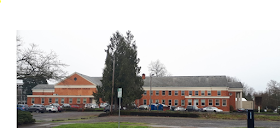By Sarah Owens and Michael Livingston
 |
| First Presbyterian Church on Chemeketa Street, one of four 2019-2020 shelters |
Typically, the season runs November 1 through March 31. Mid-Willamette Valley Community Action Agency's Ashley Hamilton told Statesman that, "The biggest hurdle [to opening three days early was] having each location cleared by Salem's fire marshal."
The Salem Warming Network, as it's now called, added a fourth warming center last year -- Capitol Park Wesleyan. Total mat capacity of the four locations: 140. The "primary" location was First Presbyterian (photo above) (capacity 78), with "auxiliary" locations at South Salem Friends Church, Church at the Park, and Capitol Park Wesleyan. Auxiliary locations were opened, or not, based on how many volunteers signed up for a shift. To open all four locations in one night required 70 slots to be filled. The network was never able to open the fourth location.
Fortunately, last winter was mild; warming was "activated" a mere 17 nights. (Activation occurs when overnight lows of <33 degrees Fahrenheit are forecast.) But, the network had other challenges.
In December, City Council banned camping on City-owned property and rights-of-way. See "Camping Ban for Christmas." Responding to criticism, Council allocated $113K to keep the warming centers open every night for the rest of the season, beginning January 1, 2020, to give campers somewhere to spend the night.
Unfortunately, only one location was willing to participate in this "duration warming" model: Church at the Park, which could accommodate up to 30 (some had to sit up) under an emergency declaration. The effort required that 12 volunteer slots be filled every night, but the volunteers came through 72 nights in a row, and the program likely would have continued past March 16, but for the coronavirus pandemic. See "COVID-19 Returns Campers to City Parks."
The continued presence of the coronavirus will require the network to make drastic program adjustments for the coming winter, and, quite possibly, the one after. Add to that the fact that the network's primary (paid) coordinator, Kaylynn Gesner, recently announced she was leaving MWVCAA. Fortunately, the City is making plans to address the situation.
 |
| Former DMV building at 2640 Portland Road NE to be a warming center |
"The building is currently leased by the Urban Renewal Agency to MERIT, an organization that provides economic and business development services to disadvantaged populations. MERIT is unable to make lease payments, has gone through leadership changes, and wishes to terminate the lease effective August 31. [MWVCAA's] ARCHES [Project] would have a couple of months to get the building ready for use before winter. The shelter use is limited by DEQ rules to no more than 18 months. Opening this winter would allow use for two winters. By then, the building [acquisition and rehab] discussed in executive session [likely 615 Commercial Street NE] would be ready [renovated to accommodate a few overnight, low-barrier shelter beds]. This all predicated on the state funding for navigation centers."
We asked City Manager Steve Powers if, in fact, the use of the Portland Road building as a warming center is "predicated on the state funding for navigation centers" but have not yet received a reply. Likely, the City just needs state nav center funding to operate the ARCHES overnight shelter/nav center, because the Urban Renewal Agency/City Council are almost certainly going to approve using $4.4M of RDURA funds for the necessary acquisition(s) and rehab. See "DAB Says NIMBY to Nav Center."
We asked MWVCAA Director Jimmy Jones about future prospects. He told us:
- Even if there is a navigation center or low barrier shelter, it is absolutely NOT going to be sufficient to support even 1/10th of the people who are outside.
- There is no money coming from the state for navigation centers this year or likely next. Gov’s office is projecting a revenue reduction of $2-3B, though it could be as low as $1B and as high as $5B. Each department has been told to prepare a budget that has a 8.5% reduction just in case.
- The viral situation is going to shift focus away from congregate shelters to motels or organized camping.
- Rooted in all these [FB] comments [on recent Council actions] (and some on the Council too) is the general belief that most of the people outside WANT to be homeless, and that there is a choice involved.
- Redwood [Crossings] is not going to be a panacea. It’s only 38 spots, and because of the design (shared bathrooms) we will have many very high needs people who can’t go there because they won’t be able to share a bathroom.
Jones has asked the Mid-Willamette Valley Homeless Alliance (the name of the new Marion and Polk County Continuum of Care or CoC) to form a workgroup to develop a regional plan for winter warming. In his request, he asserted that the issue wasn't only Salem's.
Unsheltered homelessness affects [] Marion and Polk counties, too. I think making this more of a CoC planning level element will get us to a better winter warming policy, and one that shares the burdens across all agencies and governments.The Alliance Board met this past week, but the request was not discussed.
6/17/20 Update: The Alliance's Collaborative Committee created a subcommittee to coordinate winter warming shelters, see meeting minutes here.
No comments:
Post a Comment